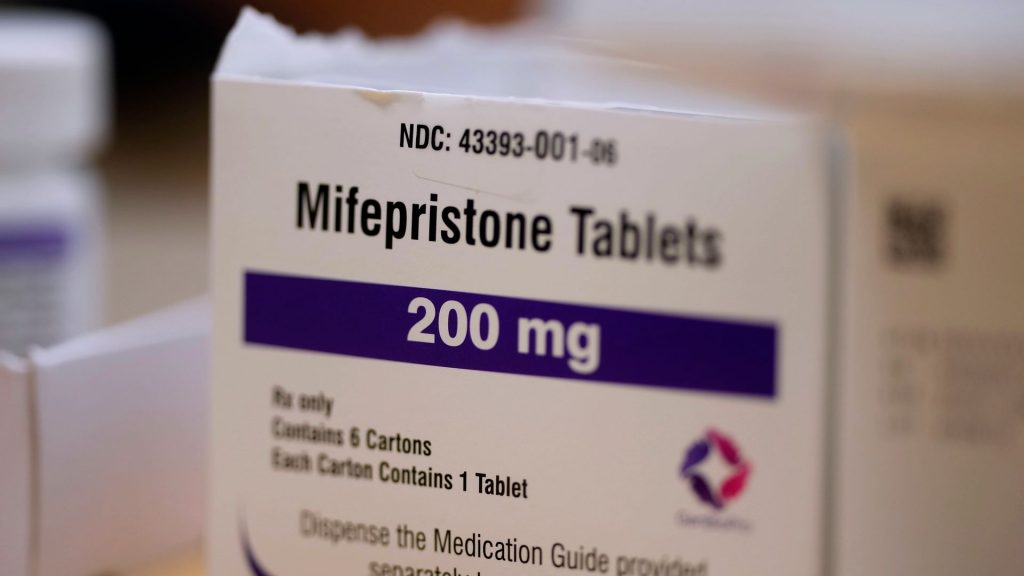Conservative nonprofit claims abortion pill side effects are underreported

Mifepristone, the most commonly used drug for medication abortions, could be linked to more serious side effects than federal sources document, according to a study published Monday, April 28. The Ethics and Public Policy Center (EPPC), a conservative nonprofit whose stated mission is to bring Judeo-Christian values back to American life, released research using insurance claims over a six-year period that suggests nearly 11% of women prescribed mifepristone experienced complications, including hemorrhaging, sepsis or other infections within 45 days of consuming the pill.
EPPC said the data comes from all-payer health insurance claims processed through private health insurance, Medicaid, Medicare, TRICARE and the Department of Veterans Affairs.
The data doesn’t include cash transactions or those in which the insurer is also the provider, which the nonprofit says are disproportionately common for abortion. This missing data could mean that the actual percentage of adverse effects differs from the reported results.
Unbiased. Straight Facts.TM
More than 5 million U.S. women have used mifepristone since it became FDA-approved in 2000.
The Ethics and Public Policy Center, a nonprofit think tank, describes its mission as opposing progressive policies and promoting a conservative consensus rooted in Judeo-Christian values.
Mifepristone’s use since 2000
Danco Laboratories is the manufacturer of brand-name mifepristone, Mifeprex, the pill used in most medication abortions in the United States. The company markets its product as “the safe and effective abortion pill,” and has been used by more than 5 million women since it was first approved in 2000.
The study’s authors claim that increased access to the medication has led to an increase in its use. Today, chemical abortions using mifepristone make up close to two-thirds of all procedures in the United States.
Meanwhile, the World Health Organization (WHO) considers the abortion pill an essential medication.
“Medical abortion has played a seminal role in expanding access to safe abortion globally, especially for women and girls in the most vulnerable situations who may lack access to health facilities or need to keep their abortion private by avoiding hospital stays,” said Dr. Bela Ganatra, head of the Comprehensive Abortion Care Unit at WHO, adding, “so it’s important that healthcare practitioners can facilitate it as an option for abortion care.”
During President Joe Biden’s administration, the U.S. Food and Drug Administration (FDA) allowed for mifepristone to be ordered online and received through the mail, something EPPC says weakened “initial safeguards.”
“The FDA chipped away at these initial safeguards, risking women’s health in order to increase access to abortion,” the study’s authors write.
What did EPPC’s study entail?
EPPC analyzed 865,727 mifepristone abortions between 2017 and 2023. The researchers claim that what’s written on the drug’s label does not adequately describe the reactions that some women face when consuming the medication.
Authors Jamie Bryan Hall and Ryan Anderson claim these adverse events are “at least 22 times as high as the summary figure of ‘less than 0.5 percent’ in clinical trials reported on the drug label.” Based on their results, they’re calling on the FDA to implement stronger protocols that ensure all doctors and medical professionals are keeping patients safe.
Critics cite decades of data
However, the Guttmacher Institute, a research and policy organization centered around sexual and reproductive health and rights, disagrees. The organization points to extensive global data and scientific consensus backing the drug’s role in protecting women’s health. In 2023, it published a post defending the pill and its use, writing, “Mifepristone was first approved in France and China in 1988, and as of May 2023, 96 countries have approved its use.”
EPPC argues that tighter regulations would reduce health risks for women and improve oversight of the drug’s use.
“The FDA should further investigate the harm mifepristone causes to women and, based on objective safety criteria, reconsider its approval altogether,” the study reads.
The FDA approved Mifeprex, the brand-name version of mifepristone, in 2000 following clinical trials of nearly 31,000 participants. The approval allowed abortions up to seven weeks of pregnancy. In September 2016, that window was extended to 10 weeks.
In 2019, mifepristone tablets were also given clearance after the FDA found them comparable to Mifeprex. The labeling and instructions for both pills are the same.
What happens next?
According to the researchers, physicians should be able to manage any complications that arise, such as heavy bleeding or an incomplete abortion, while ensuring emergency care is available to patients. They also call for mandatory reporting of all serious adverse events to the FDA and drug manufacturers –– a common requirement when new drugs hit the market, and one that mifepristone was previously subject to.
Following the release of EPPC’s study, U.S. Sen. Josh Hawley, R-Mo., called on the FDA to commission new research on the potential safety risks associated with chemical abortions.
In a letter addressed to newly confirmed FDA Commissioner Dr. Marty Makary, Hawley references a comment he made during his confirmation hearing about considering policy changes in light of new evidence.
“If the data suggests something or tells us that there’s a real signal, we can’t promise we’re not going to act on that data,” the letter states.





